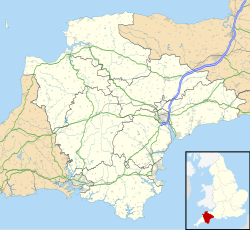| Keyham | |
|---|---|
 View of the terraced housing in Keyham | |
Location within Devon | |
| OS grid reference | SX4556 |
| District | |
| Shire county | |
| Region | |
| Country | England |
| Sovereign state | United Kingdom |
| Post town | PLYMOUTH |
| Postcode district | PL2 |
| Dialling code | 01752 |
| Police | Devon and Cornwall |
| Fire | Devon and Somerset |
| Ambulance | South Western |
| UK Parliament | |
Keyham is a Victorian-built area of Plymouth in the English county of Devon. It was built to provide dense cheap housing just outside the wall of HM Dockyard Devonport for the thousands of civilian workmen.
